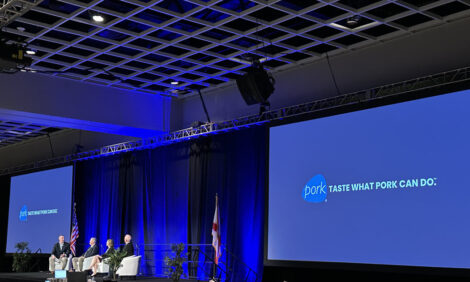



2023 WPX: US West Coast ports negotiations affect pork exports; tentative agreement reached
Labor negotiations delay shipping of US pork to trading partnersEditor’s note: The interview with Maria Zieba was held on June 8, and today, the US Meat Export Federation (USMEF) reported that a "tentative agreement" with West Coast Port workers has been reached. Details noted below.
Maria Zieba, Vice President of International Affairs for the National Pork Producers Council, spoke to The Pig Site’s Sarah Mikesell at World Pork Expo in Des Moines, Iowa, USA.
For close to a year now, West Coast ports which include Long Beach, Los Angeles, Oakland and Seattle have been operating without a labor contract for their workers.
“The longshoremen have been working without a contract in place,” said Maria Zieba, VP of International Affairs at the National Pork Producers Council. “This has all been done in goodwill between the ports and the longshoremen, continuing to work as they deal with their contract negotiations.”
The contract is split into four different areas and there has been some movement in specific areas.
“With no contract in place, things kind of came to a head on Friday, June 2, 2023,” she said. “The people became frustrated, got sick and didn't come to work.”
Workers not showing up created a backup at the ports, especially for perishable products like pork.
“The highest value that we get for our pork products internationally is for fresh pork,” said Zieba. “If we can get it from the plant to let's say, a Japanese market, they will pay premium for a product like fresh pork.”
When pork arrives at the port and there are no workers available to move it onto a ship. It means the product is staying there, and it either must be frozen or someone must find another way to move it off the dock to another distribution source.
“As of right now, we haven't been able to figure out another way of moving it off,” said Zieba. “The product is ending up in a freezer space and that means it's just lost a lot of value.”
It then needs to be sold to a different market because the Japanese consumer wanted fresh pork not frozen. These shipping delays are creating issues, and backups at the ports.
“To complicate things further, pork could be shipped through the Panama Canal. Unfortunately, Panama is going through a drought," said Zieba. “The dam levels where the water is fed into the Panama Canal are at their lowest historic levels.”
The massive ships that are supposed to go through the canal are not operating at full capacity, which is increasing the price of shipping.
“The US swine industry exports close to 25% of our production so exports are really what has been keeping us afloat as an industry,” she explained. “Now we have Prop 12, port issues and not being able to easily go through the Panama Canal, all creating this almost perfect storm of events that could impact trade in the long term.”
Port labor negotiations are a big issue and were mentioned at the White House during their press conference on June 6, 2023, according to Zieba.
“It's certainly something that has not only implications for US pork, but the entire economy as a whole and hopefully we can see a resolution soon,” she said.
USMEF reports tentative agreement reached
Late last night (Wednesday, June 14) the Pacific Maritime Association (PMA) and the International Longshore and Warehouse Union (ILWU) announced a tentative agreement on a six-year contract. The agreement, which covers all of the West Coast ports, must still be ratified by both sides. The parties will not be releasing details of the agreement at this time.
A joint statement by PMA and ILWU notes the agreement was reached with assistance from US Acting Secretary of Labor Julie Su.
USMEF President and CEO Dan Halstrom said, "This is tremendous news for US red meat exporters and their overseas customers. While the ratification process will take some time, the tentative agreement will restore stability and confidence in the performance of the West Coast ports, and this is absolutely essential for our industry. USMEF thanks the parties for their flexibility and Acting Labor Secretary Julie Su for making this matter a top priority."







